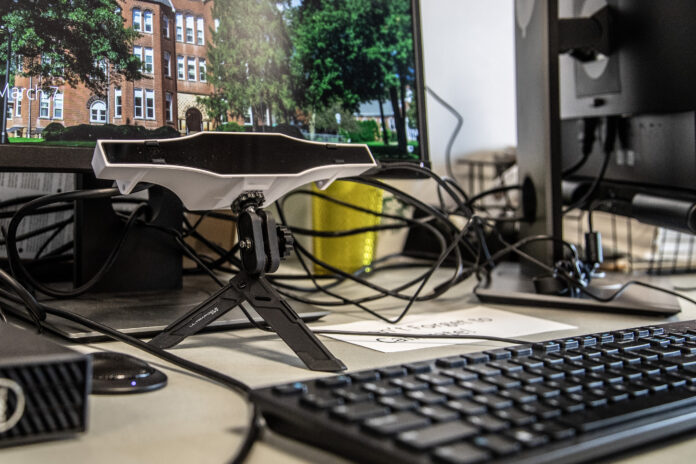Professors at SRU are often doing various research projects and studies. Professor Seth Lee has recently begun new research with eye tracking technology.
Lee is an English professor at SRU who has been at Slippery Rock for five years. His focus is on medieval and early modern literature.
Prior to coming to The Rock, Lee taught at the University of Alabama in Huntsville. One of his colleagues purchased an eye tracking device for a lab that the university was doing.
At the time, Lee was doing research on medieval illuminated manuscripts. He wanted to use the eye tracking technology to see how students who had never encountered medieval illuminations, would go about looking at them.
They showed around 20 students a series of illuminated manuscript pages and were able to write and publish the results.
Lee wanted to continue his research at SRU with the eye tracking technology. Last summer he was able to purchase the technology.
Eye tracking technology can tell and report what the eyes are focusing on and how long they look at a specific object.
Lee has three students assisting in this project.
Abigail Summers, Jacob Harvey and Harold Domville are all seniors in different majors.
“When I was putting the project together, my primary goal was building an interdisciplinary undergraduate team. So, I wanted people from different perspectives,” Lee said.
The students are currently working with Lee to gather research and learn more about how the technology can help.
“We’re trying to look at how college students perceive and kind of interact with different forms of like literature and just multimodal forms of information that they take,” psychology major, Jacob Harvey said.
The students say they are enjoying their time and feel they are learning a lot from this experience.
“A project like this brings together people from different disciplines, different backgrounds who each have their own way of thinking about the project,” Lee said.
Something the group would like to research is if a student is looking for a long period of time at a specific section of the book, would that mean the student is really understanding it or struggling to understand?
“As far as this particular project goes, I’m not sure we are going to able to answer that question yet, but we can at least get some insight into where people get caught up in that text or in this one particular scene.” Lee said.
“I think we can build in the future better questions, better testing techniques to where we can use this tech to potentially identify people who are struggling with comprehension based on how they are actually reading the text,” he said.
It is a long process for research projects to get started.
“It’s been a lot because you have to get it approved to even do the research first with human trials, things like that,” Abigail Summers, an education major, said. “We started trying to get a grant, which was denied, but then…the dean for liberal arts, he ended up funding an eye tracker for us.”
The students expressed their excitement for the project and talked about how they feel it will help their future.
“I think I really liked it, especially for the fact because I’m an education major…Getting to see how people react to different things or look and focus on different things and using that research to be able to implement it into the classroom…and then be able to make that better for my students in the future,” Summers said.
“What we want to take away from it and what we want other people to take away…is that learning doesn’t have to specifically be one thing,” Harvey said. “Like, I’m a visual learner, I learn by this. There’s a lot of different mechanisms that go into that. And I feel like the project is really going to draw upon those different mechanisms.”
The group is currently looking for SRU students to volunteer and be a part of the experiment for data collection. If students are interested, they should contact Lee at joshua.lee@sru.edu.
“What my hope is, after they have graduated and gone on to change the world, the next round of people come in. This will be something I’ll have different groups of people doing for the next several years,” Lee said. “We are just building up bigger and bigger data sets, where we can draw better and better conclusions.”








